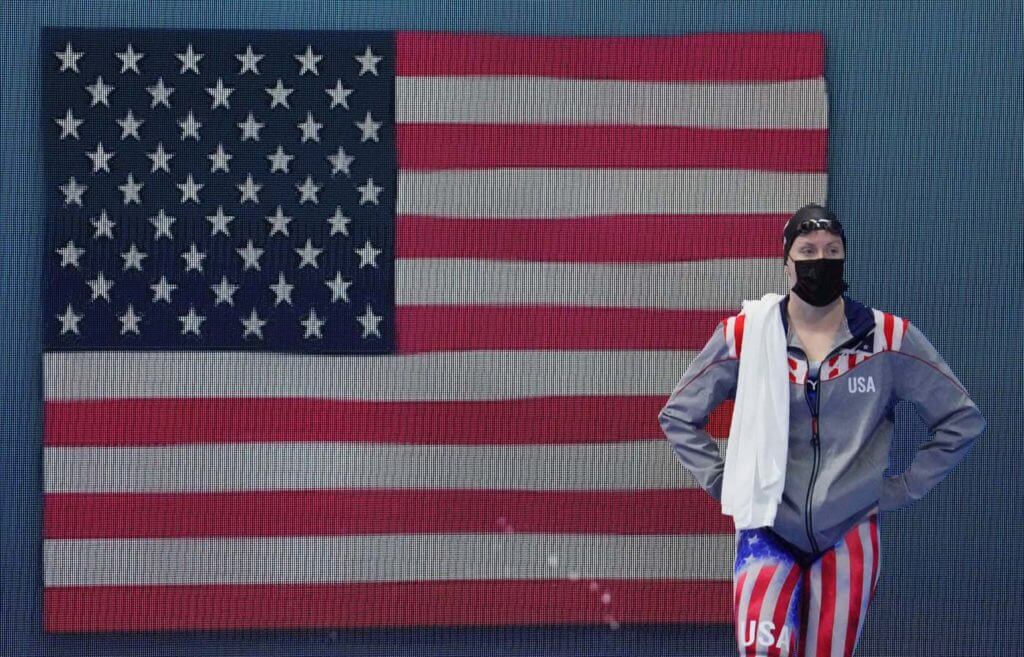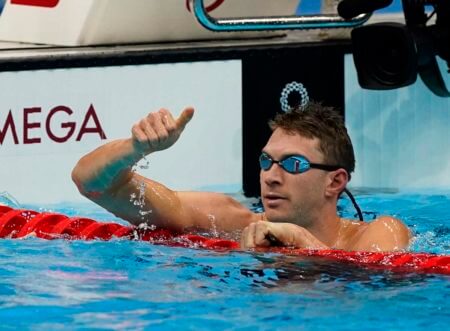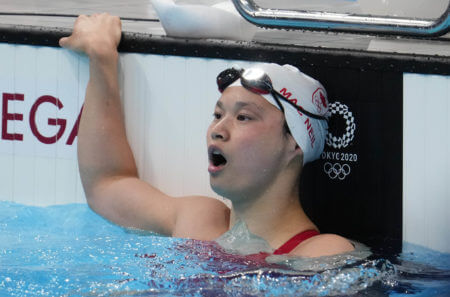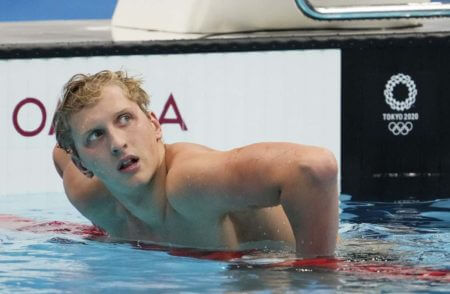Olympics Day 3 Notebook: Critical Stretch Coming for Team USA

Editorial content for the 2021 Tokyo Olympic Games coverage is sponsored by GMX7.
See full event coverage. Follow GMX7 on Instagram at @GMX7training #gmx7

Olympics Day 3 Notebook: Critical Stretch Coming for Team USA
After every bounce benefitted the United States on day one of the Tokyo Olympic swimming competition, day two brought some less joyful outcomes. Torri Huske barely missed her best time in the 100 butterfly final, but she ended up fourth, just 0.14 away from gold medalist Maggie MacNeil and an agonizing one hundredth behind bronze medalist Emma McKeon. Michael Andrew ended up fourth in the 100 breaststroke, another occasion where a lifetime best would have been quick enough for a podium spot. And then Katie Ledecky delivered a truly magnificent effort in the 400 freestyle that was just not enough to hold off Ariarne Titmus for gold.
How will the tide turn on day three? Because the Americans could end the session winning three gold medals or zero. Neither outcome would be all that surprising.
It’s tough to envision the lone American in the men’s 200 freestyle final, Kieran Smith, claiming a gold medal, but he has podium potential depending on how things shake out (more on that in a bit). But then will be the women’s 100 backstroke final, where Regan Smith enters as the top seed after setting an Olympic record in the semifinals. Smith’s 57.86 from Monday morning was the second-quickest mark of her career, behind her previous world record of 57.57. But on either side of her will be the new world-record holder, Kaylee McKeown, and the two-time world champion and No. 3 performer in history, Kylie Masse.
Smith could win gold. Or McKeown could. Or Masse. Most likely, they all end up on the podium in some order, but gold, silver and bronze remain up in the air.

Ryan Murphy took the top seed in the men’s 100 backstroke semifinals at the Tokyo Olympics — Photo Courtesy: Rob Schumacher — USA Today Sports
It’s a similar story in the men’s 100 backstroke, where defending champion and world-record holder Ryan Murphy swam a quick 52.24 in semifinals to earn lane four for the final, but Kliment Kolesnikov is just 0.05 back after swimming a 52.15 in prelims. Evgeny Rylov and Xu Jiayu, considered favorites along with Murphy and Kolesnikov prior to the meet, have not been stellar so far in Tokyo, but you still could not be surprised with any order of finish here, and Australia’s Mitch Larkin or Italy’s Thomas Ceccon could play spoiler. Murphy could win, but that’s no lock. Remember, he did fade to fourth in the event at the 2019 Worlds.
The women’s 100 breaststroke, meanwhile, will feature Lilly King up against the South Africa’s Tatjana Schoenmaker, her strongest 100-meter challenger in four years. Schoenmaker put up an Olympic record of 1:04.82 in prelims—taking down King’s Olympic record—and then notched a victory over the 24-year-old American in the semifinals. King will surely win a medal here, and teenage teammate Lydia Jacoby could get on the podium as well, but Schoenmaker is formidable and has built up some confidence through two rounds.
So a lot hinges on day three’s results for the U.S. team. It could be a banner day for a group always pushing for another show of dominance, or it could be another zap to the momentum built during that six-medal day one.
O Canada!
Back at the 2016 Games, a young Canadian women’s team achieved a landmark performance for that country in the pool as then-16-year-old Penny Oleksiak became just the second Canadian woman to ever capture Olympic swimming gold (joining Anne Ottenbrite, who won the 200 breaststroke at the 1984 Games) and two Canadian relays made the podium, the first time that had happened since 1988. This year’s group is on track to surpass that performance.

Maggie MacNeil in shock after capturing gold in the women’s 100 fly at the Tokyo Olympics — Photo Courtesy: Robert Hanashiro/USA Today Sports
During Monday morning’s finals, Maggie MacNeil became the third Canadian woman to earn Olympic gold as she touched out Zhang Yufei to win the 100 fly, and a day before that, she and Oleksiak were both part of a 400 free relay team that returned to the Olympic podium. But when Oleksiak got to the wall 0.03 ahead of the USA’s Simone Manuel to earn the silver medal, that was Canada’s highest ever finish in an Olympic relay. All seven previous medals the Canadians had won were bronze.
And after Canada finished with six medals at the 2016 Games, they could top that mark in Tokyo with six days to go. Oleksiak has certainly had her ups and downs since Rio (she has still never won an individual medal at the World Championships), but expect her to get one and maybe two this week. She qualified second in the 200 free prelims in 1:55.38, beating her lifetime best by more than a second. She split 52.26 anchoring the 400 free relay, the third-fastest split in the field, so she should definitely post a strong defense of her gold medal in that event.
Taylor Ruck has struggled at these Olympics – she was dropped from the 400 free relay finals squad and then finished ninth in the 100 back – while Sydney Pickrem made her Tokyo debut in the 200 IM and qualified sixth in prelims after scratching the 400 IM with a non-COVID-related medical issue. We’ll see if Pickrem has a medal push in her. And Canada has a new budding star in 14-year-old Summer McIntosh, who set a Canadian record by finishing fourth in the 400 free, and she qualified fifth for the 200 free semifinals. McIntosh might not win an individual medal in Tokyo, but she will provide a key leg on a medal-contending 800 free relay. And her rapid improvement track has her destined for the top of international podiums in short order.
Remember, McIntosh is 14!
And while Canada’s women remain a much stronger team than their male counterparts, the men’s 400 free relay team narrowly missed a medal in that event, which no one expected. Australia needed a 46.44 anchor split from Kyle Chalmers to get past the surprising foursome led by 37-year-old Brent Hayden, back for his fourth Olympics following a 2012 retirement and 2019 comeback. Hayden won bronze in the 100 free in 2012 in 47.80, and his relay leadoff split was very close to that at 47.99. It is believed that Hayden is the oldest man to ever break 48 in the 100 free.
Who Delivers Their Best in 200 Freestyle Final?
We have harped on this point all week: the Olympics are about racing and who performs on a given day. The best do not always touch first, and records are meaningless in an Olympic final. To wit, five men have broken 1:45 in the 200 free so far in 2021, but only two have been that fast thus far at the Olympics. One of them (Katsuhiro Matsumoto) finished 17th in the event and did not advance to the semifinals. Duncan Scott swam a 1:44.61 in the semifinals, and Hwang Sun-Woo was 1:44.62 in prelims, but that’s it. The second qualifier for the final was improving American Kieran Smith at 1:45.07.

American Kieran Smith has entered the mix for the medals in the men’s 200 free — Photo Courtesy: Rob Schumacher — USA Today Sports
So who delivers a performance at their best or close to their best in the Olympic final tonight? None of the principles in this race have an amazing track record at this point in their careers. Danas Rapsys, the third seed, swam great in the 2019 World Championships final but only after false starting. Smith out-performed all expectations by claiming bronze in the 400 free Sunday morning. Beyond that, Scott and Malyutin were off their best times when they tied for 200 free bronze at the 2019 Worlds.
The other four men in the final, Hwang, Great Britain’s Tom Dean, 16-year-old Romanian David Popovici and Brazil’s Fernando Scheffer, will be competing in their first major international final, and all four men swam slower in the semifinals than they did in prelims.
By best times, Rapsys is the fastest in the field. By best times this year, it goes Scott, Dean, Hwang and Malyutin. But who will be the Olympic medalists and who will claim Olympic gold? No idea – whoever performs when it counts.
Kolesnikov and ROC to Bounce Back?
The men’s 400 free relay final brought a huge disappointment for the Russian Olympic Committee squad. Considered a co-favorite for Olympic gold with the United States, the team barely qualified for the final and then the foursome of Andrei Minakov, Vladislav Grinev, Vladimir Morozov and Kliment Kolesnikov ended up seventh, two seconds away from a medal. Kolesnikov, in particular, was disappointing. Anchoring the relay just minutes after his 100 back semifinal, he split 48.40, more than a second slower than his 2021 flat-start best of 47.31.
So can Kolesnikov get back on track for the 100 back final? Because he absolutely can win that race. Among the favorites, only Kolesnikov and Ryan Murphy have really impressed so far at the Olympics, but we’ll see if he can put the relay disappointment aside and be at his best in the 100 back final. Kolesnikov has been as fast as 52.09 this year in the event (an unofficial time, since it was a mixed 400 medley relay leadoff leg), and it would not take much faster than that (if any faster) to win Olympic gold.




